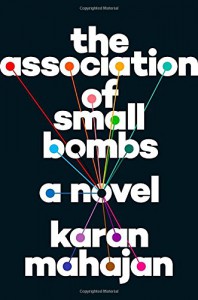The Association of Small Bombs, by Karan Mahajan

From the Tournament of Books longlist.
I finished this critically acclaimed book while away for the holidays and jotted down a list of likes/dislikes. Short story shorter, I liked it, but what a downer.
The synopsis from amazon:
When brothers Tushar and Nakul Khurana, two Delhi schoolboys, pick up their family’s television set at a repair shop with their friend Mansoor Ahmed one day in 1996, disaster strikes without warning. A bomb—one of the many “small” bombs that go off seemingly unheralded across the world—detonates in the Delhi marketplace, instantly claiming the lives of the Khurana boys, to the devastation of their parents. Mansoor survives, bearing the physical and psychological effects of the bomb. After a brief stint at university in America, Mansoor returns to Delhi, where his life becomes entangled with the mysterious and charismatic Ayub, a fearless young activist whose own allegiances and beliefs are more malleable than Mansoor could imagine. Woven among the story of the Khuranas and the Ahmeds is the gripping tale of Shockie, a Kashmiri bomb maker who has forsaken his own life for the independence of his homeland.
I admired the novel's intricate structure as it shifts across time and multiple points of view. As a writer, I'm always greatly impressed by such a feat when it is accomplished smoothly and clearly. The different points of view also offer insight into how a victim might become a terrorist or sympathetic to one or his cause, how other victims may become advocates, how someone moderate in his faith might become an extremist, how a terrorist may walk away free and be disaffected even as he commits or aids in more acts of terror. In the case of these characters, often it's the personal or psychological rather than the political that provides the impetus for violent action. Refreshingly, this novel does not feel ideological.
The prose is also accomplished, and I liked that the author wrote to his best reader; he did not define or explain cultural or religious terms that may be unfamiliar to a white, atheist Westerner like me. I had no problem looking up information for myself.
Despite what I was drawn to in the novel's craft, I felt the characters were held at a remove, as if I were looking down on them from above. This prevented me from fully connecting with them and the novel as a whole. Without that connection, I finished the story with a feeling of, "Well, that happened." There was nothing to counterbalance the weight of events, not enough beauty to keep the novel from simply depressing me. At times the metaphor of the titular bombs was also heavy-handed.
I can see what critics admire in this work, but I left it feeling untouched.
 4
4










